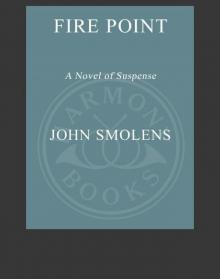- Home
- John Smolens
The Schoolmaster's Daughter
The Schoolmaster's Daughter Read online
The
SCHOOLMASTER’S
DAUGHTER
The
SCHOOLMASTER’S
DAUGHTER
JOHN SMOLENS
In memory of my wife,
Patricia Anne Miles Smolens
War’s begun—and school’s done.
John Lovell, Headmaster
The Latin School, Boston
April 19, 1775
PART ONE
April: The Alarm
In the fall of 1774 and the winter of 1775, I was one of upwards of thirty, chiefly mechanics, who formed ourselves into a committee for the purpose of watching the movements of the British soldiers, and gaining every intelligence of the movements of the Tories. We held our meetings at the Green Dragon Tavern. We were so careful that time we met, every person swore upon the Bible that they would not discover any of our transactions but to Messrs. Adams, Doctors Warren, Church, and one or two more.
—Paul Revere, Boston
I soon received intelligence from Boston that the enemy were all in motion, and were certainly preparing to come out into the country.
—Reverend Jonas Clark, Lexington
I
A Small Incident
OF A TUESDAY EVENING, ABIGAIL LOVELL HAD JUST ENTERED Dock Square when the music of waterfront commerce, shopkeeps and fishmongers hawking their goods, was broken up by the sound of running footsteps, a shout, and then a collision. Twilight made it difficult to see: a boy sprawled on the cobblestones, two redcoats standing over him. Bostonians gathered round, fearfully silent now. Abigail pushed through the crowd and found that it was her younger brother, Benjamin, on the ground. One of the British soldiers had his rapier drawn.
“And why are you in such a hurry?” the sergeant demanded, holding the tip of his blade within an inch of Benjamin’s throat.
“Begging your pardon, sir,” Benjamin said. “It’s my fault.”
Every day, such incidents in Boston: the occupier and the occupied.
Abigail recognized the other soldier, a Corporal Hubert Lumley, who billeted with a neighbor on School Street. “Sergeant Munroe,” Lumley said. “I suggest it’s nothing intentional on the boy’s part. Merely an accident. And I recognize him. He’s the schoolmaster’s son, and as you see he’s—”
“I am to see what, Corporal?” Munroe turned to Lumley, angered by his impertinence.
Lumley was perhaps the same age as Abigail, in his early twenties. He was dark-haired and the shorter of the two soldiers, but seemed to have considerable self-possession, enough that Sergeant Munroe appeared thwarted, and he returned his attention to Benjamin. “The schoolmaster’s son, you say? On your feet, lad.”
Careful of the sergeant’s sword, Benjamin got up off the cobblestones, his britches smeared with butcher’s blood, fish guts, straw, and manure, standing with his back to Abigail. He was seventeen; tall, lean, yet with inordinately broad shoulders, the result of rowing in the harbor. His tricorn lay at his feet.
“Your hat?” Lumley said.
Benjamin nodded.
“Well,” Munroe said, pouting, “aren’t you going to retrieve it?”
Reluctantly, Benjamin picked up the tricorn, which Lumley snatched away. He began to inspect the inside of the crown.
“And where are you going in such a hurry?” Munroe asked Benjamin.
“Home, sir. I was just—”
“Sergeant,” Abigail said, stepping forward. Both soldiers appeared startled that she would even think of intruding. “Please, sir. The corporal is correct. This is my brother, Benjamin Lovell, and he was indeed on his way home. We live on School Street, but a few doors from Corporal Lumley’s billet.”
Her brother nodded slowly, wary of the sword which was still pointed at his neck. Incredulous, the sergeant touched the steel tip to Benjamin’s skin, just above the Adam’s apple.
“Sergeant.” A voice to Abigail’s left, and then, as the crowd parted, an officer approached, causing Munroe and Lumley to stiffen. “No need for that.”
Reluctantly, Munroe lowered his arm, holding the sword at his side. “Of course, Colonel Cleaveland.”
Lumley seemed to comprehend the delicacy of the moment, and he looked up from the hat in his hands. “And you might be … Mistress Abigail Lovell?” he said.
Several of the people in the crowd snickered.
“Yes, I am Abigail Lovell. And our father is the headmaster at the Latin School, and, well, he’s quick to employ discipline with his ferule. Late for dinner customarily brings two whacks, one for each palm.” She gazed about at the crowd, drawing them into the conspiracy. “But, of course, you understand this all really has to do with fishing.”
Munroe looked as though he’d heard enough prattle, but Colonel Cleaveland seemed mildly interested. “How so, Miss?” he asked.
“Well, sir. On such a spring evening young men must needs go fishing down to the harbor, but my brother will not be allowed to venture forth until he has eaten a proper supper.”
There were more snickers: Fishing, indeed.
“Or perhaps if the tide’s out,” she offered. “They might row across the Back Bay to go digging in the clam beds.”
And there were consenting murmurs and nods. Aye. In beds.
The colonel studied the crowd, his gaze deliberate, suspicious. Taller than the other two soldiers, he was a different cut of Brit. Blond hair smoothed back and tied in a neat queue with a fine ribbon. Deep blue eyes, a clean-shaven jaw. “This is not about fishing, young lady,” he announced for everyone’s benefit. “But order. These two soldiers patrol the streets of Boston in an effort to maintain order.”
“But, sir—” she began.
“Do not confuse the issue,” he said, looking at her now, and his eyes became, reluctantly, she thought, genuinely curious. And she herself suffered a moment of reluctance, much as when she would stare at herself in the looking-glass, to find silky brown tresses spilling over her shoulders, a rather long jaw, eyes large-lidded, and a mouth that she thought too wide. It was her friend, Rachel Revere, who often said, you are too critical in your self-regard. I note the way men look upon you. “Mistress Lovell, is it? You do recognize the necessity of such street patrols?”
Abigail said nothing, merely staring back at him. Sometimes, with men, silence was best. In the presence of their occupiers Bostonians often dissembled, frequently conspired, and it often led to sorrow, shame, and even bloodshed. But Abigail’s last resort was silence. Look a man in the eye and speak not.
The colonel studied her with a cold, deliberate eye. Did he take this reticence for a bold challenge, or was he merely admiring the way strands of her dark hair drifted across her cheek?
After a moment, Lumley said, “Begging your permission, sir.” And when Colonel Cleaveland nodded his approval, reluctantly, it seemed, Lumley took a small step toward Abigail. “Your father, Schoolmaster Lovell,” he said as he considered Benjamin’s tricorn once more, as though here he would discover the secret, the true threat. “If I am not mistaken, he is an outspoken Tory, loyal to the king?”
“He is that, sir,” Abigail said.
“But then your brother,” Lumley said, looking up at her suddenly. “Your other brother, your older brother, that would be—”
“Yes, James Lovell, he is the usher, the assistant headmaster at my father’s school.”
“Also loyal to the crown?” Lumley asked, and when she did not reply he smiled indulgently. “I think not. No, in fact, he has quite the reputation and has been known to deliver some of the most fervent speeches on matters of taxation, liberty, and … your provincials’ notions of independence.” Abigail was about to speak, but Lumley raised his free hand. “I expected to find a missive tucked
inside this hat,” he said. “Boys frequently run through these crowded streets, acting as couriers for the likes of Samuel Adams and Dr. Warren and their patriotic mob. But—” he held out Benjamin’s hat. “There be no damning evidence here.”
“Boston boys are given to running,” Abigail offered.
Colonel Cleaveland asked, “And why do they run?”
“It’s in their nature.”
“Their nature?” Munroe said. He was clearly put out that Lumley had taken possession of the moment, as well as the hat, and now he gazed at Abigail, his eyes drifting down the length of her. With some of them, there was that, too. “Corporal, perhaps you’re searching in the wrong place.”
“You are insulting, sir.” Abigail stared back at the sergeant until he looked away.
The Bostonians, gathered around them like water surrounding a peninsula, showed their appreciation with snorts and laughter. This was bold—bold and raw, like the salt wind that scoured this city.
Lumley considered the crowd, recognizing how often such ribald humor had suddenly turned to aggression, here in the city streets, where cobblestones and bricks could easily be taken up against the occupiers. To quiet them, he said loudly, “Perhaps we should inspect everyone’s hat. And shawl. And pockets. Secrets—you’re all bearing secrets, are you not?”
The crowd quickly turned sullen, and seemed to press forward slightly, poised.
“I assure you,” Abigail said quickly, sensing that this incident might easily get out of hand. “My brother—both my brothers wish you no harm.” All three soldiers considered her now. “Gentlemen, are not we all British subjects here?”
There was absolute silence in Dock Square, for no one had an answer.
“Subjects,” Lumley said finally. “Quite right. We’re all subjects.” Impatiently, he returned the hat to Benjamin, as though to hold it another moment would result in an irreparable contamination. He then took a step backward, a gesture that seemed to suggest that the danger had passed, the worst was over, and they best get on about their business.
Abigail looked at Munroe then. He appeared to have no choice but to go along, and he stiffened with resentment—he was the soldier of rank on this patrol, before Colonel Cleaveland had intruded. Reluctantly, he sheathed his rapier. “Well, boy,” he said to Benjamin, “we will be on patrol throughout the night, so don’t let us catch you out and about—”
“Escort your sister home now,” Colonel Cleaveland said, with the slightest bow toward Abigail, and for a moment he seemed to recognize the absurdity, perhaps even the humor of such an incident. “You’ll not want to let your chowder get cold.”
“Thanking you kindly, Colonel,” Abigail said as she took her brother’s arm. “We must make our haste for dinner, Benjamin, lest we invoke the wrath of our father.”
Laughter then as the crowd began to break up. Something to take home, or to the grog shop: a Boston girl, her younger brother, and three lobsterbacks in the evening shadows of Dock Square. There was a moment when it could have become something dangerous, something inevitable. Such encounters often led to incarceration, fines, or both. How many Bostonians languished in British prisons under false or trumped-up charges? It was a seemingly small incident such as this that had led to the Bloody Massacre five years earlier.
Occupied and occupier.
“Good evening, then,” Abigail said.
Corporal Lumley touched the brim of his hat.
However, Sergeant Munroe seemed unable to respond. He still gripped the handle of his sword, as though eager to draw it from his scabbard once more.
The crowd parted, allowing Abigail to cross the square toward Fanueil Hall, holding Benjamin close to her side. “That was brilliant,” she whispered. “Not putting anything in your hat.”
“What would I carry?” he asked as they skirted a small pond of muddy water.
“You’re not carrying a letter?”
Abigail was five years older than Benjamin, and clutching his upper arm she guided him through the crowded streets, as she had since they were small children, until he suddenly took her by the hand and pulled her down an alley. Boston was a warren of narrow lanes, crooked alleys, and Benjamin employed them constantly. They turned a corner and negotiated their way through a bleating flock of sheep which was being herded toward King Street.
“Mind your step,” Benjamin said.
“Benjamin, we do not have to enter our own house by the summer kitchen.”
“Front doors are for Father’s Tory associates,” he said. “Besides, I’m not going home.”
Most houses had room for vegetable gardens and livestock, and many were backed by a barn or stable. There were the sounds—and the odor—of animals everywhere: chickens, cows, horses, swine, goats, not to mention seagulls wheeling overhead. When they were clear of the sheep, Benjamin and Abigail reached a passageway cluttered with rain barrels standing between the blackened clapboard walls of two houses. He led his sister down this damp, mossy nook until they were in a tight courtyard, which was nearly dark. Overhead garments hung from clotheslines, fluttering in the salty breeze that came off the harbor.
“Turn around,” he demanded as he released her arm.
She glared at him. “And have you play one of your impish pranks? No.”
“As you wish.” He began to unfasten his belt buckle, and then reached down inside the front of his loosened britches. “Here,” he said, handing her an envelope.
“Warm,” she said. “Good thing those two soldiers didn’t decide to search you more thoroughly. You’d be taking your dinner aboard the prison ship anchored in the harbor.”
“I need you to deliver it,” he said. “I haven’t time.”
“No fishing tonight?” Holding up the envelope, she said, “Who is this from?”
“You needn’t know that. It’s safer not to—”
The envelope was fastened with a wax seal. “Nor should I even know the contents.”
“No, no, you shouldn’t. Look, it’s just a sign, a signal that you’re the legitimate courier.”
“And what am I supposed to—”
“You hand over this letter and you’ll receive another.”
“Another letter?”
“Without this you get nothing.”
“This is a rare precaution.”
“It is, yes. But you have noticed the redcoats today?”
“There’s much activity,” she said. “They’re gathering on the Common.”
“In full field gear.”
“A drill? They often parade on the Common. Or do you think this is it?”
“We’ve known that they would march out from Boston soon. There have been so many signs, preparations—”
“But General Gage,” she said with a quick smile; “he does like his decoys.”
“True.”
“Where am I to deliver this letter?”
He removed his tricorn and curled the brim.
“Benjamin?”
He wouldn’t look at her. “Province House.”
“The governor general’s mansion—isn’t that just fine.”
He put his hat back on his head and stared at her.
“And I give this to … General Gage himself?”
“You take it to the carriage house,” he said. “There’s a groom named Seth. Deliver it to no one but Seth.”
“Have you ever done this before, taken something to Province House?”
“I just go where I’m told,” he said, “but, no, I’ve never gone to the governor’s house before. Tonight I think you’ll have a better chance of getting through, especially after what happened earlier.” He shook his head. “Besides, there’s something else I must do. Listen, go immediately to Province House. I’m told Seth has just come back from Barbados. Missing an ear. Sorry to ask you to do this. With the redcoats gathering at the Commons, street patrols will be stopping runners everywhere tonight.”
“As I told the colonel, Benjamin, boys run. Boston women walk. And I walk wher
ever I want in this city—even if it’s to Province House.” She smiled, but her brother did not, and she suddenly understood that he was nervous, perhaps even afraid. “And after I give this letter to the groom?”
“You will be given a reply—which you must take straight away to James.”
“So he can encode it.”
“Probably. Then he’ll determine what’s to be done with it.” Benjamin looked impatiently up the alley. “I must go.”
“Father will be upset. It appears we will both miss our supper.”
“Father is always upset.”
“Usually, at least.”
Benjamin looked at her then, and it was there in his eyes, if only momentarily: he was again the boy who not many years earlier would come to his sister’s bed, frightened by a reprimand, or a nightmare. On such nights she would draw him to her beneath the warmth of the counterpane and hold him tight.
“Where are you going, Benjamin?”
“Can’t say. You understand.”
“I do. But I worry—I worry that you’ll …”
“Disappear.”
“Dear Benjamin, you have been finishing my sentences since we were children.”
“We both have.”
It was true. When they had been very small, no one in the family could understand what Benjamin was saying, except Abigail, and they all looked to her for an interpretation.
“It’s Ezra,” he said. “You’ve not heard from him?”
“No,” she said. “Not since he left Boston two months ago. I am beginning to wonder—”
“If he means to disappear. From you.” She stared at her brother, afraid, exposed. “You chose him, Abigail. So you run the risk, but I don’t think he’s disappeared because he doesn’t love you.”
“Sometimes in such matters, in matters of the heart, we have no choice.”
“I suppose not.”
He started up the alley, but paused and turned around. It was almost dark now and she could barely see his face. He pulled his hat down snug on his head, causing his long hair to curl out over his ears. “I think it’s beginning finally, tonight.”

 The Anarchist
The Anarchist Wolf's Mouth
Wolf's Mouth The Schoolmaster's Daughter
The Schoolmaster's Daughter Quarantine
Quarantine Fire Point
Fire Point